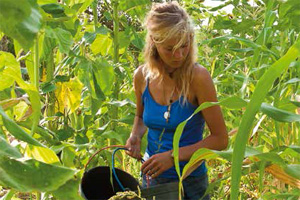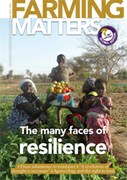We have read about poverty, vulnerability and resilience of family farming. The articles in this issue of Farming Matters have shown that there is an urgent need for a change in mindset regarding family farming, agriculture and food systems. And resilience must be the central concept in this new thinking.
Resilience

The term ‘resilience’ has become fashionable in development circles, and when a word gets fashionable it tends to be used in many different ways. But clearly, it refers to the capacity of farming families to resist crises, natural, economic or social. What helps? An ability to anticipate, to have more options, to be able to better manage, and to have reserves to be to able to bounce back.
Resilience is about food sovereignty: having control over your food system, diversifying agriculture and ways to generate income, to innovate and share what we learn. Depending on the context, one or other aspect of resilience comes out stronger. Individual farm families can be resilient, groups of resilient farmers can form a movement. Resilience makes for virtuous cycles.
Why have vulnerabilities increased?
Farmers have become increasingly vulnerable as crises have multiplied, while policy support has been largely inadequate. In Haiti, already impoverished farming communities deal with the consequences of a devastating earthquake. In Ghana and the Sahel, governments focus attention on agricultural growth in high productive areas while dryland farmers suffer from lack of investment and recurring droughts. In India, small scale family farmers fall into debt, some after using ineffective pesticides and BT cotton seeds that did not deliver on their promises, with an alarming and increasing number of suicides. Increased vulnerability is the result of accelerated degradation of the natural resource base, increased outmigration, the aggressive role of agrochemical industries, policy neglect towards communities living in these areas, and on top of this, comes climate change and natural disasters.
What we see is a resilience deficit. Rural communities struggle to handle crisis after crisis. Eventually they have no reserves left. Poverty and hunger become ever-present threats or realities. A small crisis then becomes a big crisis. The response? Expensive disaster relief or preventive measures to enable farmers to better cope with future disasters!
Agricultural policies rarely appreciate farmers’ own inbuilt resilience, the essence of family farming. Farmers are approached as recipients of emergency aid, of ‘climate-smart’ crop varieties developed by plant breeders who have never talked to a real farmer. There is a gross underestimation of the self learning and self organising capacity of family farmers. Traditional farming practices are far from stagnant. Family farmers are supremely innovative, and with just a little of the right type of support, they will leap out of the poverty trap with incredible speed.
Today’s dominant agricultural thinking is grounded in a linear model of development, searching for higher and higher yields of a very limited number of crop varieties and animal breeds and produced by ever fewer farmers. In the Netherlands, one of the biggest agricultural exporting countries in the world, there are only 70,000 farmers left; in Germany, young farmers have to compete with multinationals for land.
There is an increasing focus on only one part of the global food and agriculture system without adequate consideration of the whole. Huge environmental costs are seen as externalities. And although highly vulnerable and unsustainable, this model has taken over in many countries in the developed world, has created severe imbalances in many Asian and Latin American countries, and is now being rolled out in Africa. As Million Belay says, this is a dead end road, and as a result, small scale farming families are going hungry. We need to look at agriculture as a system and see clearly the strong interdependencies of its component parts.
Change happens
Farming communities all over the world are moving forward and building their resilience. Some are capitalising on new democratic spaces generated by the IYFF. The agroecological movement in Brazil especially in the semi-arid Nordeste, the growing Non Pesticidal Management movement in South India, and Farmer Managed Natural Regeneration in the Sahel – these three serve as learning examples and as sources of inspiration for us all.
In such dryland regions, local knowledge is still more alive than in highly productive areas, and farmers and scientists are also co-creating knowledge and practices that build the resilience of farming systems.
Six more months left in the IYFF
A false notion of emergency has been created – we have to feed nine billion people in 2015. The reality is that there is enough food produced, but that it is unequally distributed, and with unacceptable amounts of food going to waste. There is still time to make a u-turn, however, and to start creating possibilities for poor rural and urban communities to access food, and to rebuild their capacity to resist shocks in a variety of very practical ways.
A resilient farming system starts with the holistic management of nutrient cycles, water, energy and biodiversity. Breaking out of poverty can only happen with nature, not against it. Without agroecology there will be no family farming. In the remaining half year of the IYFF this message should resound clearly, in the villages, in the cities, in Rome, Washington, and the world over.
Edith van Walsum
Farming Matters wants to give a wider voice and visibility to family farmers building resilience. Do cast your vote in the photo competition organised by World Rural Forum and the AgriCultures Network (from July 1st 2014 via the agriculturesnetwork.org website). Do write to us, and please tell us if there is other information you would like to see in the magazine, or ideas for new regular features. Do share our magazine with others.
Email: info@farmingmatters.org

